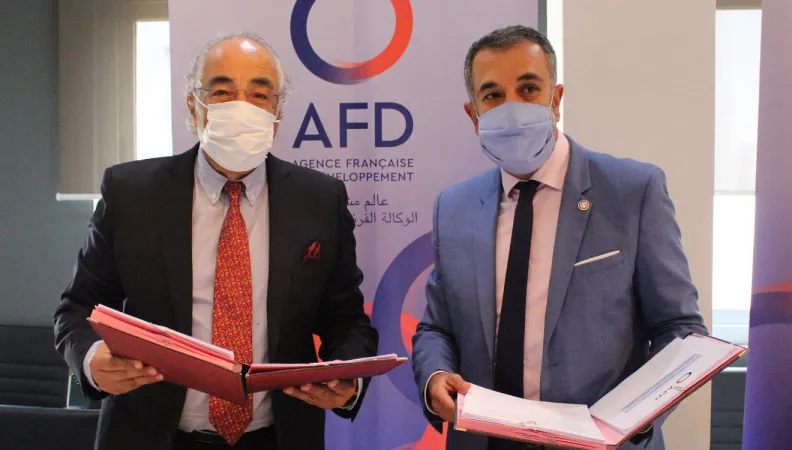Share the page
Water stress in North Africa: The French Development Agency and the Sahara and Sahel Observatory sign a new partnership

Signature of a new partnership between the French Development Agency and the Sahara and Sahel Observatory for the establishment of a regional initiative: “Water Stress and Climate Change in North Africa”.
North Africa with its naturally arid or semi-arid climate, is already living under the climate change impacts such as exacerbated water stress, declining agricultural yields as well as the increase of extreme events frequency and degree. According to a recent report from the Network of Mediterranean Experts on Climate and Environmental Change (MedeCC), the area is experiencing an increase in temperatures at a 20% rate higher than global averages, which could reach, if no further action is undertaken, + 2.2°C by 2040 and up to + 3.8°C in some regions by 2100.
The AFD Group (French Development Agency) gives a strategic priority to the resilience of economies and territories in the North African region with the ambition of continuing and strengthening its operations that aim at preserving water resources and developing unconventional resources, so that the area can cope with a situation of water stress that is likely to worsen due to the combined impacts of human activities and climate change.
The current water stress that is most likely to worsen, could increase the tensions between uses and the conventional renewable resources. In this context, it seems particularly appropriate to reflect upon the potential contribution of unconventional water resources (in particular the reuse of treated wastewater for agriculture, desalination or demineralization of water and trans-boundary fossil water) and describe the conditions and best practices associated, as well as the possible and particularly environmental risks. The regional approach appears to be very complementary to programs that historically benefited from AFD funding in the North African countries, particularly in Morocco and Tunisia.
All these reasons have led the AFD and the Sahara and Sahel Observatory (OSS), an intergovernmental organization with an African vocation established in Tunis and reputed for its expertise in water resources and climate change in arid and semi-arid areas, to jointly build the “Water Stress and Climate Change in North Africa” initiative.
The initiative comes within the framework of the Support Facility for Public Policy and Citizen Dialogue funded by the AFD and for which a research and partnership agreement was signed on November 5 with the OSS in Tunis.
The purpose of this regional initiative is to promote the dialogue of public policies in the region (Algeria, Egypt, Libya, Morocco and Tunisia) for an 18-month period and to foster a regional-scale knowledge sharing on issues and solutions to contend with these challenges. The initiative will make it possible to create avenues for dialogue with the production of summary documents by country and at the regional level and the release of research documents in AFD's collections.
A high-level exchange workshop will also be held in Tunis in June 2021. It will mainly target and involve decision-makers from the relevant countries as well as high decision-making level officials working within sector but also cross-cutting ministries, the scientific community, civil society and the private sector as well.
Julie Gonnet in charge of the program at AFD's Regional Directorate in North Africa: "These topics are particularly relevant for countries in the region. The increase in temperatures and the relative decrease in rainfall expected according to the climate models of the region should lead to a worsening of the water stress situation while all countries already register resource availability levels below the UN-defined scarcity threshold (1,000 m³/inhabitant/year) and less than 650 m³/inhabitant/year. By working on shared issues, the initiative should promote exchanges, knowledge sharing, the dissemination of good practices and innovative solutions that would help achieve the sustainable development goals such as access to water, food security, the preservation of natural resources and the fight against climate change. It will use the already existing channels of dialogue by linking up with other initiatives already launched on these topics".
Khatim Kherraz, Executive Secretary of the Sahara and Sahel Observatory: "The five countries involved in this project are all in a water stress or water scarcity situation, which climate change will not improve, on the contrary. It is therefore necessary to explore all avenues that would allow either better management of available conventional resources or the mobilization of additional unconventional resources, with the greatest possible respect for the environment. I am also happy to see the AFD and OSS cooperation develop, in areas that are still too little covered, for the benefit of our member countries."
Press contacts:
- AFD: Julie Gonnet ; Kouraich Jaouahdou
- Sahara and Sahel Observatory: Nadia Khammari ; Lilia Benzid
